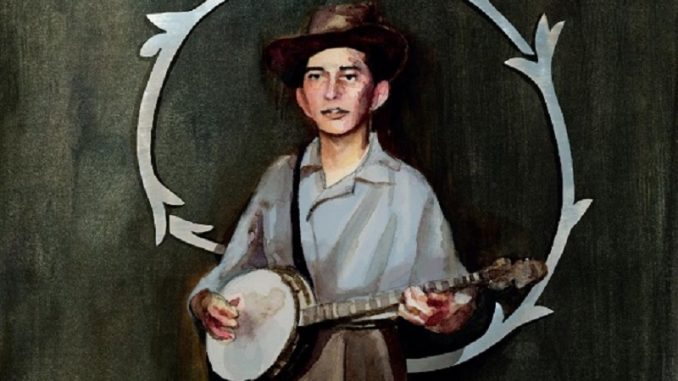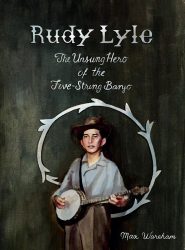
 Max Wareham is well placed to write a book on the five-string banjo- he plays the instrument in the Peter Rowan Bluegrass Band and has had a long career as a music tutor and himself studied the banjo with Tony Trischka and Bill Keith. His debut book focuses on Rudy Lyle, who Wareham regards as a forgotten early shaper of Bluegrass. Rudy Lyle replaced Don Reno in Bill Monroe’s Blue Grass Boys, which is significant in itself but he also received accolades from Monroe who said of him: “There was Earl Scruggs, then Don Reno, they were wonderful banjo players but when Rudy Lyle came in there with me even Earl and Don was listening to Rudy. He could really roll that banjo and he was powerful.” The book that Max Wareham set out to write was a classic tutor style, discussing Lyle’s style and illustrating it with Tabulature transcriptions of his playing taken from recordings. The more Wareham dug into Lyle’s contributions to the development the more fascinated he became with him and the book expanded in the biographical sections. There is little to work with – the only extensive interview with Lyle appears to be one conducted by Doug Hutchens which formed the basis of an article in ‘Bluegrass Unlimited‘ in 1985 – and this is reproduced in full in the book. Wareham, however, hit upon the idea of interviewing as many of Lyle’s contemporaries as he could find – an inspired notion as this yielded up recollections from the likes of Bill Emerson and Sonny Osborne (both of whom passed a few months after the interviews), as well as Doug Hutchens and perhaps most interestingly of all from the biographical point of view Rudy’s brother Bobby who naturally can cast a unique light on aspects of Rudy’s personality.
Max Wareham is well placed to write a book on the five-string banjo- he plays the instrument in the Peter Rowan Bluegrass Band and has had a long career as a music tutor and himself studied the banjo with Tony Trischka and Bill Keith. His debut book focuses on Rudy Lyle, who Wareham regards as a forgotten early shaper of Bluegrass. Rudy Lyle replaced Don Reno in Bill Monroe’s Blue Grass Boys, which is significant in itself but he also received accolades from Monroe who said of him: “There was Earl Scruggs, then Don Reno, they were wonderful banjo players but when Rudy Lyle came in there with me even Earl and Don was listening to Rudy. He could really roll that banjo and he was powerful.” The book that Max Wareham set out to write was a classic tutor style, discussing Lyle’s style and illustrating it with Tabulature transcriptions of his playing taken from recordings. The more Wareham dug into Lyle’s contributions to the development the more fascinated he became with him and the book expanded in the biographical sections. There is little to work with – the only extensive interview with Lyle appears to be one conducted by Doug Hutchens which formed the basis of an article in ‘Bluegrass Unlimited‘ in 1985 – and this is reproduced in full in the book. Wareham, however, hit upon the idea of interviewing as many of Lyle’s contemporaries as he could find – an inspired notion as this yielded up recollections from the likes of Bill Emerson and Sonny Osborne (both of whom passed a few months after the interviews), as well as Doug Hutchens and perhaps most interestingly of all from the biographical point of view Rudy’s brother Bobby who naturally can cast a unique light on aspects of Rudy’s personality.
Rudy Lyle’s story is often one of greatness interrupted – having escaped an abusive childhood and found the banjo his playing with Monroe was interrupted by the Korean War and he returned by all accounts a changed man. This was partially due to what he had seen and done but also, and significantly for his musical career, he had damaged hearing to the extent that he eventually mutilated his banjo in an attempt to wring a louder sound out of it. There is an interesting chapter on how Wareham tracks down what remains of that banjo. Lyle moved on from Bluegrass to the electric guitar and record producing covering country, funk and psychedelic rock. This second musical career was itself interrupted when Jimmy Dickens hired a hitman to kill Lyle, who had run off with Dickens’ wife. Rudy shot first – an act deemed to be self-defence but which earned him a sentence to be worked off as a prison administrator. He also roomed with Willie Nelson, played for Jerry Lee Lewis and knew Elvis who dug ‘Blue Moon Of Kentucky’. And if that wasn’t enough to remark on Rudy Lyle also built and flew biplanes when he wasn’t doing anything else. Really at times, it is enough to make the reader think that there’s a film in here.
The Tablature section which makes up the bulk of the book covers everything that Rudy Lyle recorded with The Blue Grass Boys as well as live recordings from various shows including Grand Ol’ Opry appearances. This covers breaks and back-up playing, and is introduced with a short section analysing the key components of Lyle’s banjo style. Naturally, this is a major selling point for a banjo player – you won’t find any of this in other “classic” tutors such as Trischka’s ‘Banjo Song Book‘ which covers Scruggs, Reno and Osbourne (amongst others) in its section on mainstream bluegrass players. So if you want to play some of those classic songs – ‘White House Blues’, ‘Bluegrass Ramble‘, ‘Raw hide‘ – from the early 1950s , and you’re not up to transcribing them note by note, then this is essential reading. There are links for online videos to see these being played. There’s a range of music within here, some any moderate banjo player would cope well with, some harder and one that has the best description I think I have ever seen in such a book, on ‘Letter From My Darling‘ Wareham states “This is, quite literally, impossible to play. The 24th fret on the first string is the one in question here, mainly because it does not exist.” He then discusses how this feat may have been achieved concluding “perhaps Rudy pressed the string down extra hard or used his fingernail to make it sound as clear as the others, but this seems very difficult when you consider the speed of the phrase.” This simple text emphasises why this book needed to exist – if someone is playing something that has such an experienced player puzzled then they are clearly worthy of greater attention.
In summary – the background biography and the interviews are fascinating reading for anyone who cares about Bluegrass and the banjo. However it is still the Tablature which, deservedly, will sell this book. Max Wareham is to be congratulated for casting such a clear light on a distinctive and influential style of playing.
Rudy Lyle The Unsung Hero of the Five-String Banjo by Max Wareham is published by Gateless Gate Music Publishing, and was released on August 23rd.


